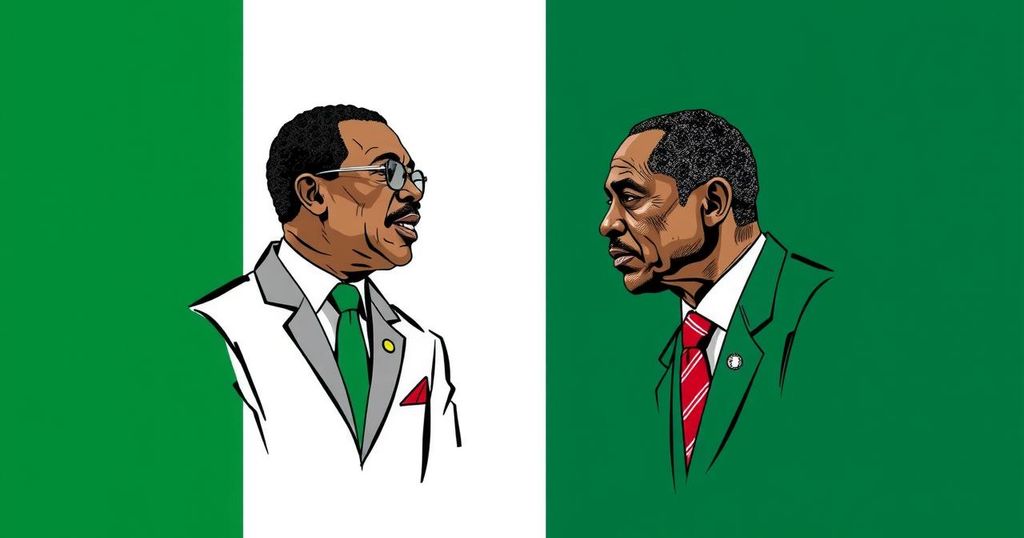The author reflects on the challenges of accepting electoral defeat, drawing parallels between the recent Nigerian presidential election and the U.S. election. They discuss the emotional turmoil of supporting candidates like Goodluck Jonathan and Peter Obi, their unexpected losses, and the subsequent impact on societal division and political integrity. The necessity of humility and unity in post-election discourse is emphasized for both nations.
The recent U.S. presidential election has concluded, bringing a sense of urgency for individuals, particularly those whose preferred candidates did not secure victory, to accept the outcome. As someone who has endured similar challenges in Nigeria, I understand the difficulty of this transition. My personal experiences in Nigeria, particularly during the contentious elections between Goodluck Jonathan and Muhammadu Buhari, illuminate the complexities and emotional toll that accompany electoral loss.
In 2015, I supported Jonathan despite his shortcomings, believing he was the superior candidate compared to Buhari. Following Buhari’s eight-year term marked by economic decline and socio-political unrest, I supported Peter Obi in the 2023 election, hoping for a significant change for Nigeria. However, the results were disappointing, and Obi’s subsequent legal challenges against the election results reflected a broader sense of disenfranchisement among his supporters.
The recent electoral outcomes in Nigeria mirror manipulations seen in other democracies. Following Bola Tinubu’s controversial election, accusations of electoral fraud plagued his ascent to power, similar to the legal challenges faced by Donald Trump during his election cycle in the United States. Critics have observed that both elections exemplify a failure to uphold democratic values and standards, leaving citizens to grapple with disillusionment.
As Nigeria’s socio-economic challenges intensify under Tinubu, the divisive nature of electoral politics fuels a climate of hatred and vitriol. This unfortunate trend is also reflected in the U.S., where supporters of Trump and Kamala Harris have engaged in unyielding political hostility.
Navigating the aftermath of an election requires humility and a commitment to civil discourse from the victors. Moving beyond partisanship and embracing inclusivity may foster healing within divided communities. Both Trump and Harris called for unity, yet skepticism persists regarding their ability to deliver on these promises. It is imperative that words of unity translate into actionable efforts to bridge the societal rifts that have emerged in both nations.
In summary, the challenges of post-election adjustment are universal, necessitating collective efforts towards healing and unity. As citizens, we must transcend allegiance to political divisions and seek a shared purpose that prioritizes the welfare of all individuals regardless of differing ideologies.
This holistic view is essential for both Nigeria and the United States, where citizens must strive to engage constructively with one another, aiming for a brighter future.
The article reflects on the post-election sentiments and experiences of a Nigerian journalist who parallels the electoral outcomes of Nigeria with those of the recent U.S. presidential election. The piece draws on personal anecdotes to explore the emotional toll of electoral defeat, the nature of political disillusionment, and the societal implications of polarized politics. By highlighting the challenges faced by both nations, the article seeks to provoke thought on the importance of unity and respectful discourse in navigating post-election landscapes.
The article underscores the difficulties individuals face in accepting the outcomes of elections, drawing on personal experiences from Nigeria and making comparisons with the U.S. political context. It emphasizes the necessity for humility and dialogue among political factions to foster healing and unity. In both Nigeria and the U.S., the need for cooperative efforts to move forward and address societal challenges remains critical. Ultimately, political engagement should prioritize community well-being over divisive rhetoric.
Original Source: baptistnews.com






